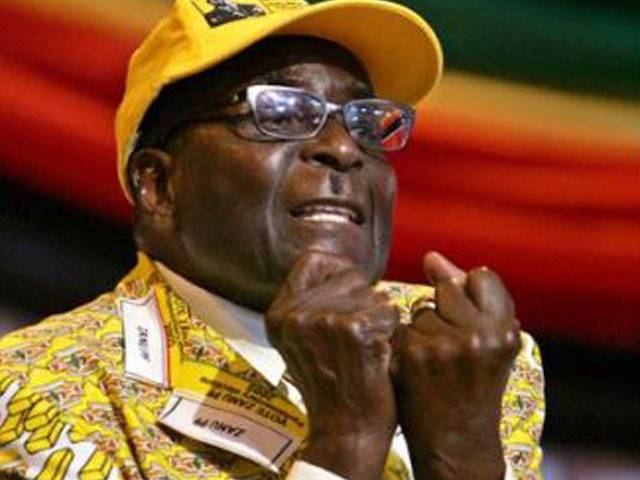HARARE - Supporters of veteran President Robert Mugabe voiced confidence that his 33-year-rule will be extended Wednesday, when Zimbabweans vote in elections that many opponents fear will be rigged.
Around 6.4 million people are eligible to cast their ballots in the first round of presidential and parliamentary elections that are likely to be the 89-year-old’s last campaign. Mugabe has become an international pariah thanks to a series of bloody and flawed elections that have kept him in power since independence from Britain in 1980. The last presidential vote in 2008 was marred by bloodshed, which forced now PM Morgan Tsvangirai out of the race despite a first round win.
Tsvangirai, a 61-year-old former trade unionist, will face Mugabe again this time, ending four years of uneasy govt cohabitation urged by the int’l community.
Amid recovery from an economic crisis that saw mass unemployment some of the highest rates of inflation ever recorded, Mugabe loyalists insist their independence hero is “tried and tested”.
“We have won already. It’s a walk-over,” said Jestara Mziwanda, a supporter of Mugabe’s ZANU-PF.
“This year nobody was beaten, or forced to attend any meeting, but the numbers of people at rallies say it all.”
The runup to this year’s vote has seen little of the violence that marred previous polls, but Mugabe’s opponents point to a more subtle form of manipulation.
With less than 24 hours before polls open, the Zimbabwe Electoral Commission had yet to provide Tsvangarai’s party or non-governmental groups with a list of eligibles to voters.
“Interested parties have not seen a consolidated voters roll, in violation of the law,” said Irene Petras, director of Zimbabwe Lawyers for Human Rights.
In June, the Research and Advocacy Unit, a non-government group, reported that the roll included one million dead voters or people who have emigrated, as well as over 100,000 people aged over 100 years old.
By 1000 GMT Tuesday, opposition senator and minister for education David Coltart told AFP that no printed or searchable electronic copies of the roll had been made available.
On Monday Justice Rita Makarau, head of the Zimbabwe Electoral Commission, insisted the country and the commission was ready for the vote.
“We will have free and fair elections,” she told journalists.
As campaigning officially wound down on Monday, both camps drew huge crowds of supporters and sounded confident of victory.
During a final campaign rally on Sunday, Mugabe promised further indigenisation of white and foreign-owned assets.
He has also threatened to behead homosexuals, painted his rival as a foreign stooge and warned Zimbabweans against change, citing the fallout after deadly uprisings in Egypt and Libya.
“See what is happening in Egypt. They were fooled and advised to remove their leaders.”
Egyptians are “fighting each other” and the West “are observers now as if they don’t know the mischief they caused”.
On Monday Tsvangirai drew a vast crowd in central Harare who directed a chant of “game over” at Mugabe.
Tsvangirai has promised to create one million jobs and has used Mugabe’s advanced age as campaign fodder.
“How can you let an old man push a plough when there are young people around,” Tsvangirai told his supporters during his final rally.
“I want Mugabe to enjoy his retirement in peace and quiet,” hinting that Mugabe may be granted immunity if he relinquishes power.
Credible opinion polls are rare, but in one survey from July last year, Afrobarometer reported a statistical dead heat between the two main parties.
But a quarter of respondents refused to reveal their preference because of what pollsters dubbed the “margin of terror.”
Since then a series of sex scandals and allegations of party corruption have dogged Tsvangirai, making it difficult to judge his popularity.
With the backing of state media, the military and control of most other levers of power, Mugabe remains the odds-on favourite.
“Many expect a Mugabe victory, because ‘ZANU doesnt lose elections’,” said the Brussels-based International Crisis Group.
With many Western observers barred from watching the vote, hopes for a substantial and credible account of the election now rest with the African Union (AU) and the 15-member Southern African Development Community (SADC).
But their neutrality has been questioned.
“Conditions for a free and fair vote do not exist,” said the International Crisis Group. “A return to protracted political crisis, and possibly extensive violence, is likely.”
The results are expected to be released within five days.
Tuesday, April 16, 2024
Rigging fears on eve of knife-edge Zimbabwe vote

Pakistan, IMF discussing new multi-billion-dollar program, says Finance Minister Aurangzeb
11:09 AM | April 16, 2024
LESCO ‘bars’ officers from appearing before FIA in overbilling probe
10:49 AM | April 16, 2024
Aleem Khan, Kamran Tessori discuss matters of mutual interests
10:40 AM | April 16, 2024
Global brands facing challenge from local contenders in Pakistan's FMCG market
10:24 AM | April 16, 2024
Israeli Air Force finalizes preparations for possible attack on Iran
8:21 AM | April 16, 2024
Political Reconciliation
April 16, 2024
Pricing Pressures
April 16, 2024
Western Hypocrisy
April 16, 2024
Policing Reforms
April 15, 2024
Storm Safety
April 15, 2024
Democratic harmony
April 16, 2024
Digital dilemma
April 16, 2024
Classroom crisis
April 16, 2024
Bridging gaps
April 16, 2024
Suicide awareness
April 15, 2024
ePaper - Nawaiwaqt
Advertisement
Nawaiwaqt Group | Copyright © 2024





